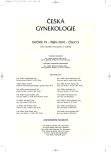-
Medical journals
- Career
Psychosocial interventions by stillbirth in history and today
Authors: K. Ratislavová 1; J. Beran 2
Authors‘ workplace: Fakulta zdravotnických studií, Západočeská univerzita v Plzni, děkanka PaeDr. I. Mauritzová, Ph. D. 1; Psychiatrická klinika FN, Plzeň, přednosta doc. MUDr. J. Beran, CSc. 2
Published in: Ceska Gynekol 2010; 75(5): 462-466
Overview
Objective:
A goal of this article is to give a review about psychosocial interventions, which health professionals use to support parents with stillbirth, about their historical development and their usage in perinatology centres in the Czech republic now.Design:
A review article.Setting:
Faculty of Health Care Studies, University of West Bohemia; Department of Psychiatry, University Hospital in Pilsen.Subject and method:
A review of literature and research in perinatology centres in the Czech republic.Conclusion:
Researches recent demonstrate a sense of critical usage of rituals at stillbirth, which give support to creating realistic attitudes to loss and initiation of the mourning process by parents, parallel with the minimisation of subsequent psychical complications by parents in long-term outcomes. In perinatological centres in the Czech republic parents can see or hold their death baby. Momentoes of the child, recommended by professional researches, are rarely collected and used there.Key words:
psychosocial interventions, stillbirth, support, care.
Sources
1. Badenhorst, W. Psychological aspects of perinatal loss. Best Pract Res Clin Obstet Gynec, 2007, 21, 2, p. 249-259.
2. Bennett, SM., Litz, BT., Maguen, S., Ehrenreich, JT. An exploratory study of the psychological impact and clinical care of perinatal loss. J Loss Trauma, 2008, 13, p. 485-510.
3. Cacciatore, J., Radestad, I., Froen, F. Effects of contact with stillborn babies on maternal anxiety and depression. Birth, 2008, 35, 4, p. 313 - 320.
4. Cameron, J., Tailor, J., Green, A. Representations of rituals and care in perinatal death in British midwifery textbooks 1937 – 2004. Midwifery, 2008, 24, 3, p. 335-343.
5. Ditz, S. Betreuung von Frauen mit einer Totgeburt. Der Gynäkologe, 2001, 34, S. 212-219.
6. Haškovcová, H. Fenomén stáří. Praha: Panorama, 1990, s. 371.
7. Henley, A., Schott, J. The death of a baby before, during or shortly after birth: Good practice from the parentsęperspective. Seminars in fetal & neonatal medicine, 2008, 13, p. 325-328.
8. Hicks, D. Ritual & Belief. New York: McGraw-Hill College, 1999. 454 p.
9. Hughes, P., Turton, P. Incidence, correlates and predictors of post-traumatic stress disorder in the pregnancy after stillbirth. Brit J Psychiatry, 2001, 178, p. 556-560.
10. Hughes, P., Turton, P. Assessment of guidelines for good praktice in psychosocial care of mothers after stillbirth: a cohort study. Lancet, 2002, 360, 13, p. 114-118.
11. Hughes, P., Turton, P., Evans, C. Long-term psychosocial sequelae of stillbirth: phase II of a nested case-control cohort study. Arch women’s mental health, 2009, 12, 1, p. 35-41.
12. Leifer, G. Úvod do porodnického a pediatrického ošetřovatelství. Praha: Grada, 2004, s. 249-250.
13. Navrátilová, A. Narození a smrt v české lidové kultuře. Praha: Vyšehrad, 2004, 416 s.
14. Nijs, M. Trauern hat seine Zeit. Abschidsrituale beim fruhem Tod eines Kindes. Gottingen: Hogrefe-Verlag, 2003. 207 S.
15. Radestad, I., Surkan, PJ., Steineck, G., Cnattingius, S. Long-term outcomes for mothers who have or have not held their stillborn baby. Midwifery, 2009, 25, 4, p. 422-429.
16. Špatenková, N. Poradenství pro pozůstalé. Praha: Grada, 2008. 144 s.
17. Štembera, Z., Velebil, P. Vývoj perinatální úmrtnosti v ČR. Inter Med pro praxi, 2003, 3, s. 21-25.
Labels
Paediatric gynaecology Gynaecology and obstetrics Reproduction medicine
Article was published inCzech Gynaecology

2010 Issue 5-
All articles in this issue
- Forceps delivery - an outdated obstetric technique?
- Vacuumextraction
- Lesions of peripheral nerves in obstetrics and gynecology. A review
- Analysis of uterine ruptures in Vysočina region in 5 years period
- Streptococci group B in perinatology
- Analysis of the set of pregnancy women with asthma bronchiale
- Possibility to identify fetomaternal haemorrhage
- Laboratory and clinical indicators of the state of the newborn after birth
- Changes in the developmental outcome of very low and extremely low birth weight infants at 24 months’ corrected age born in 1997–2007
- Psychosocial interventions by stillbirth in history and today
- Recurrent spontaneous ovarian hyperstimulation syndrome
- Safety of TVT-O
- The efficiency of oral contraception containing drospirenone in treating symptoms of premenstrual syndrome or premenstrual dysphoric disorder in gyneacology practice
- Hormonal treatment effectivity in hyperandrogenic syndrome
- Czech Gynaecology
- Journal archive
- Current issue
- Online only
- About the journal
Most read in this issue- Laboratory and clinical indicators of the state of the newborn after birth
- Vacuumextraction
- Lesions of peripheral nerves in obstetrics and gynecology. A review
- The efficiency of oral contraception containing drospirenone in treating symptoms of premenstrual syndrome or premenstrual dysphoric disorder in gyneacology practice
Login#ADS_BOTTOM_SCRIPTS#Forgotten passwordEnter the email address that you registered with. We will send you instructions on how to set a new password.
- Career

